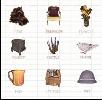 Deerhoof have always done an admirable job of spanning the wide gulfbetween pure pop and pure noise. The most recent release from the San Franciscoquartet is their strongest synthesis of noise and pop yet.
Deerhoof have always done an admirable job of spanning the wide gulfbetween pure pop and pure noise. The most recent release from the San Franciscoquartet is their strongest synthesis of noise and pop yet.Kill Rock Stars
While early recordings were more nowave then they were power pop, albums like Reveille and Apple’O foundthe band stringing the two together, as though it were the most naturalthing in the world, while Milk Man altered the approach, utilizingkeyboards and atmospheric samples. Obviously, it didn’t sound like popmusic to most, but behind the skronky guitars and absurdist tales ofwarped childhoods and bent sexuality, there were great songs. Though it would havebeen enough for them to rest on their achievements of past releases, itseems pretty clear that the band have released their strongestcollection of songs yet.
At 20 tracks, TheRunner’s Four can seem a bit overwhelming, and while the first half ofthe album is seemingly devoted to the band’s more accessible material,the second half is just as rewarding. “Chatterboxes” opens the album with a suitably menacing guitar line andSatomi Matsuzaki’s airy vocals. It’s an understated opener for an albumthat is bursting at the seams with angular guitars and sublime pophooks. More indicative of the album as a whole is “Running Thoughts,” ajazzy number carried by drummer Greg Saunier’s crashing rhythm andslinking guitar that seemingly ebbs and flows through its nearly fourminute duration with hardly any effort. “Spirit Ditties of No Tone” isnear psychedelic in its execution, with Matsuzaki spouting offabsurdist couplets over the acid drenched guitars of John Dieterich andChris Cohen. Throughout The Runner’s Four, Deerhoof’s strong sense ofsurreal storytelling remains intact, such as on the lost pirates’ tale“Odyssey.” Elsewhere, “Lemon & Little Lemon,” bubbling keyboardgives way to brushed percussions and soft vocals.
With The Runner’s Four, Deerhoofseem poised to gain a whole new legion of fans.
samples:
Read More

